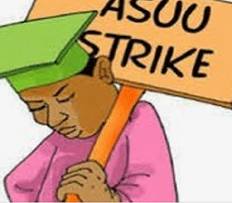University students in Nigeria state owned universities are in apprehension as members of the Academic Staff Union of Universities, ASUU, finalise decision on an impending strike at the end of an ongoing meeting at the University of Lagos as at February 13, 2022.
Before the meeting, ASUU, issued a three-week ultimatum to the federal government to address all issues in the December 2020 Agreement.
Strike actions have become a term synonymous with Nigerian university system since the formation of ASUU from the defunct Nigeria Association of University Teachers, NSUT, in 1978. In 1980, the union declared a trade dispute, with university autonomy at the forefront of the squabble.
Since 1999, there has been over 14 separate industrial actions from the union averaging at least a strike every 18 months or two strike per academic session. This constant strike actions in the university system has had debilitating effects on students as well as economic activities of university communities.
In March 2020, ASUU embarked on a strike that lasted for 10months. This was to push home their demands for the implementation of the most talked-about 2009 ASUU/FG Agreement the union entered into with the federal government.
In 2009, lecturers in public universities across the country embarked on an industrial action that lasted for four months. The strike which started in June was called off in October.
Before the strike was called off, the Federal Government and the union had an agreement. The 2009 ASUU/FG agreement would later become the reason for subsequent industrial actions. This agreement was further renegotiated in 2013 after another 5 months’ strike.
The meet of this agreement is the provision of funding for the revitalization of public universities by way of education budgetary increase to a minimum of 26%.
In 2012, the FG inaugurated Needs Assessment committee to assess the level of decay in publicly funded varsities in and come up with recommendation on how to reposition it to attain global standards. The assessment was undertaken in 74 (37 federal and 37 states) public funded universities.
The committee recommended that a total of N1.3trillion would be needed to make Nigerian universities close to world standards. It was agreed this would be paid between 2014 through 2018. That is, 200billion in 2014 and 220billion in 2015, 2016, 2017 and 2018. Former President Goodluck Jonathan was the only government that paid the first tranche of 200billion naira in 2014.
Since the coming of the present administration, the federal government has been consistent in reducing budgetary allocation to education and did nothing with the agreement until the 2019 strike when the government paid only N20 billion (instead of 220billion naira for 2015) to revitalise public varsities as a show of commitment to the agreement. With a promise to pay 55billion each quarter but failed woefully to do this until the 10months long strike in 2020.
The latest warning by the ASUU giving the Federal Government three weeks to meet up with the agreement, has sent shivers in the spines of many students and their parents. The history of the government constantly reneging on its promises does not help matters as stakeholders in public universities remain apprehensive.
The latest threat by the union is fueled by the refusal of the government to abide by the agreement reached in December 2020 where it was concluded that the FG will pay N30billion being tranche of the N220billion revitalization fund.
Secondly, the issue of members not being paid for as much as six months, and in some cases professors allegedly being paid as little as N8000 as monthly salaries.
This anomaly was largely as a result of the dispute between members of the union and Federal Government on their refusal to enroll on the Integrated Payroll and Personnel Information System, IPPIS.
ASUU believes the introduction of IPPIS into Federal Universities will compound the problem of regular flow of fund and personnel management. The union rather presented the University Transparency Account System, UTAS, as a viable alternative to the IPPIS.
Before the strike was suspended in December 2020, the Federal Government agreed to allow National Information Technology Development Agency, NITDA, to run an integrity testing of UTAS before accepting it.
With less than 2 weeks to the deadline given by ASUU, it is important that the National Assembly is wading into the matter in other to avert another protracted industrial action.
There, however, has to be sincerity of purpose on the side of the government in keeping to it’s part of the memorandum of agreement. NITDA should hasten the testing process for UTAS to determine its applicability.
If our graduates must compete with the very best in the world, both ASUU and the Federal Government need to make concerted effort to end the perennial strike actions that is crippling tertiary education in Nigeria.



